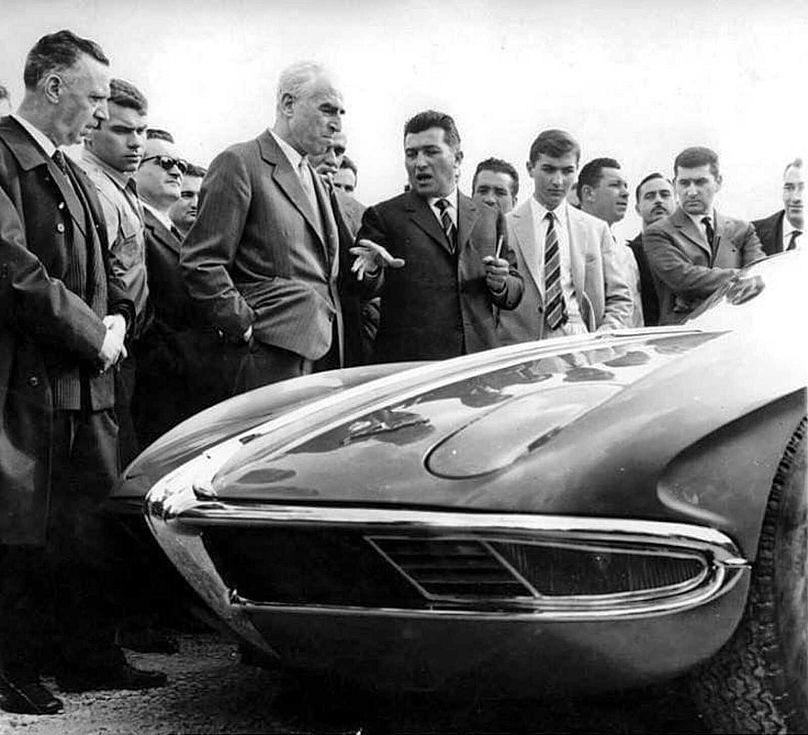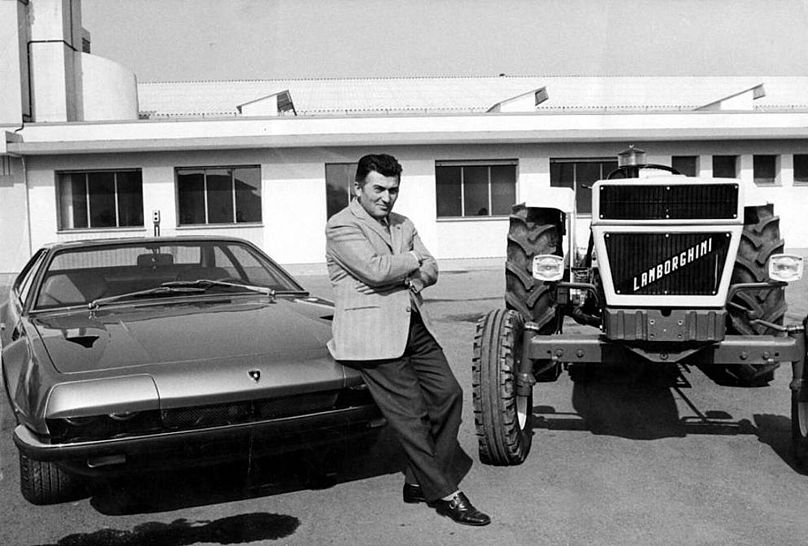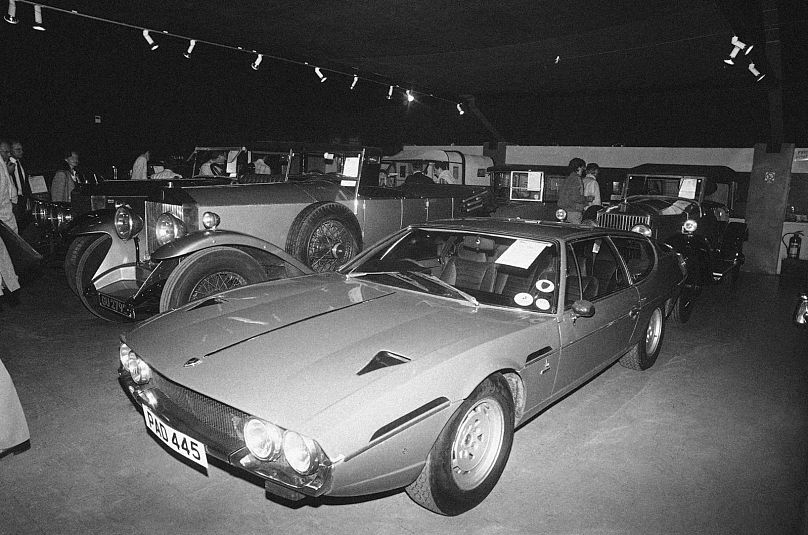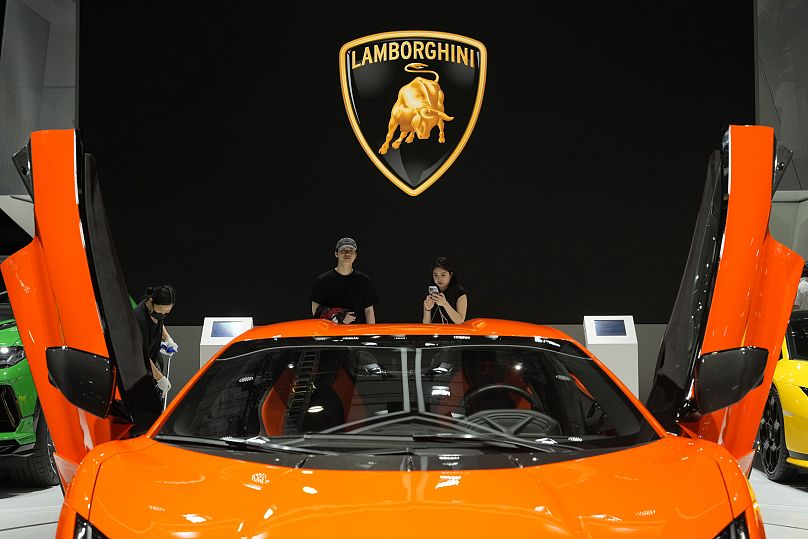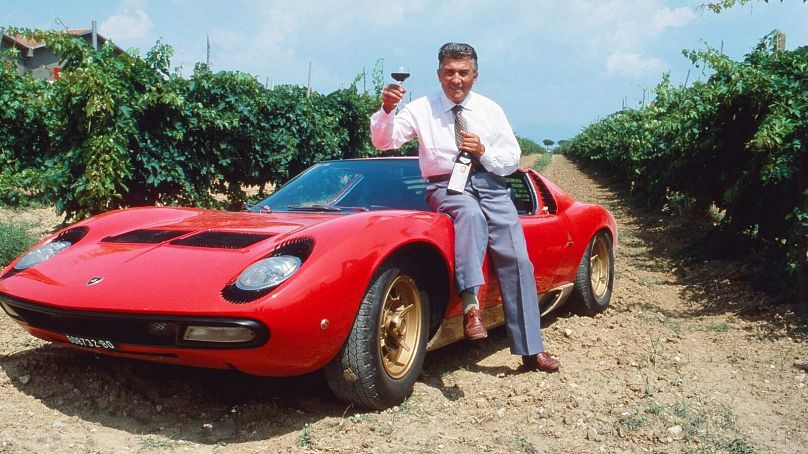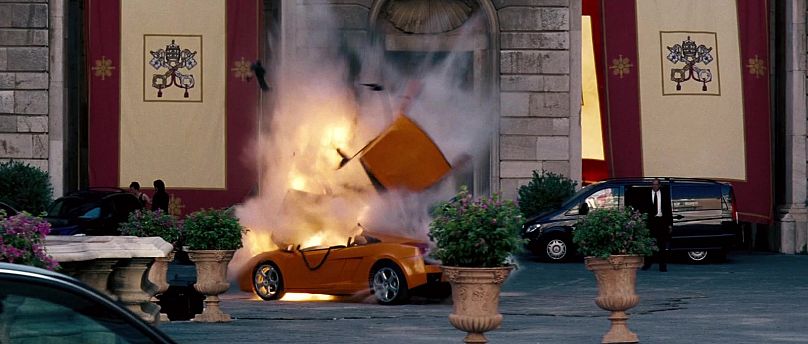60 years of Lamborghini: From luxury cars to reality show pop stars
On the 60th anniversary of Lamborghini’s launch, Euronews Culture takes a look at the history of one of Italy’s most iconic cars and the family behind the wheel
In May 1963, a car was born.
In the small town of Sant'Agata Bolognese in northern Italy’s humid plains, the up-and-coming mechanic and entrepreneur Ferruccio Lamborghini set up his eponymously titled company, releasing a two-seated, two-door grande coupé, the 350 GT.
The 47-year-old businessman had a rural upbringing, and had made a name for himself designing tractors for Italy’s farmers. But within a few years, his surname would become a byword for unapologetic opulence and Italian glamour, and a rival to Italy’s signature powerhouse, Ferrari.
On the 60th anniversary of Automobili Lamborghini’s launch, Euronews Culture takes a look at the history of one of Italy’s most iconic cars - and the family behind the wheel.
From tractors to Ferrari's rival: how a status symbol was born
"Legend has it that Ferruccio Lamborghini was so disappointed with his Ferrari, that he decided to build his own sports car". With these words, Professor A. T. McKenna opened his 2002 book, Lamborghini, chronicling the supposedly dramatic incipit to the luxury brand’s history.
Indeed, Automobili Lamborghini has long been widely regarded as the lovechild of a conflict. As an avid car enthusiast and sharp-eyed mechanic, Ferruccio had noticed some flaws in Ferrari’s clutches. The story goes that, after voicing his complaints to the company founder, Enzo, back in the early 1960s, Ferruccio received a dismissive response that left him reeling with indignation.
Such was his umbrage that he decided to prove his worth by taking on the automobile Goliath himself, and launching his own rival sports car shortly afterwards.
The Ferrari-Ferruccio feud makes for a compelling anecdote, however embellished it may be. But Lamborghini has a much longer history and can trace its roots all the way back to northern Italy’s muddy fields.
Ferruccio Lamborghini was born on 28 April 1916 in Renazzo Cento, deep in Emilia-Romagna's fertile Po Valley, to a farming family of modest means.
From an early age, Ferruccio dreamt of motors, but found his aspirations interrupted after he was drafted into Italy’s World War II Air Force.
Upon his return to a country ravaged by the shackles of war and the legacy of a fascist dictatorship, the burgeoning mechanic decided to channel his skills into turning scrap metal into tractors for struggling farmers.
Ferruccio's early career was a textbook success story of Italy's post-war miracolo economico ("economic miracle"). While the country profited from US Marshall Plan funds and quickly took its place as one of the world’s leading industrial powerhouses, Lamborghini too became a prosperous businessman, purchasing various luxury vehicles along the way.
Among these was a Ferrari 250 GT acquired in 1958 - the car that allegedly unleashed the Ferrari feud.
Come 1963, Ferruccio’s lifelong dreams came to fruition, as he finally debuted his new sports car design at the Turin Motor Show.
Ferruccio’s fascination with Spanish bullfighting sealed the deal, as he made the bull the company logo - in contrast with Ferrari's iconic galloping horse - and named his first models the Miura and Islero.
Come the middle of the decade, Lamborghinis garnered acclaim for their power and chic design. The ultimate stamp of approval came in 1968 when the Miura was displayed at New York’s Museum of Modern Art (MoMA). By the 1980s, Lamborghini had become an ubiquitous symbol of luxury, the cars' sharp lines and aggressive Transformer-like edges evoking Boccionian futurism and embodying Italy’s newfound capitalist confidence.
"[T]he low-slung, aggressive styling of its cars and their eye-popping performance has made the company's charging-bull symbol familiar to auto enthusiasts worldwide," wrote The New York Times in 1987.
But amid the golden years of the company’s success, Lamborghini was no longer in Ferruccio’s hands.
Reversal of fortune
In 1974, Ferruccio sold off the entirety of his brand, which would consequently be acquired by a multitude of companies. Lamborghini experienced oscillating waves of challenges and success, struggling in the midst of the 1970s oil crisis and bankruptcy while thriving in the 1980s, only to experience another downturn in the 1990s.
Upon the turn of the millennium, the Volkswagen-held brand put out new models and has not lost any of its appeal, with the Huracán, Urus and Aventador continuing to uphold Lamborghini's ethos of powerful, stylish comfort.
But what about Ferruccio himself? Following the sale of his brand, the multi-millionaire's career shifted down into first gear, as he devoted the remainder of his life to more bucolic pursuits: namely, winemaking in Umbria's rolling hills. His retirement from the world of luxury cars did not, however, hamper his entrepreneurship, with his estate producing over 800,000 wine bottles a year.
"When you stop working, you start to die!" he told one reporter in 1991.
Ferruccio eventually died on 20 February 1993, a mere two months before his 77th birthday. The Lamborghini winery was passed on to his daughter, Patrizia, and two years later, his son Tonino opened the Centro Polifunzionale Ferruccio Lamborghini museum in honour of his legacy.
Lamborghini on the silver screen
As a globally recognised status symbol, it's no surprise that Lamborghini steered its way onto the silver screen.
In January this year Ferruccio’s own life was immortalised in one Italian production, "The Man Behind the Legend". The reviews have been far from encouraging, alas, with the film merely scraping a 6% critic rating on Rotten Tomatoes.
Ferruccio’s cars, however, have received a more stellar cinematic treatment. From the James Bond classic The Spy Who Loved Me to the Wolf of Wall Street or Marvel's Doctor Strange, the iconic brand has featured in an array of Oscar-nominated box office hits.
One of the more memorable examples includes the 2006 spy action blockbuster, Mission: Impossible III, starring Tom Cruise, Maggie Q and Philip Seymour Hoffman.
In a scene set in the Vatican City, Q - who plays field agent Zhen Lei - is ordered to blow up the Lamborghini used by Cruise's character, Ethan Hunt. The vehicle's allure does not go unremarked.
"It's such a nice car," Q's Lei laments, shortly before pushing the button that sends the sleek orange Gallardo flying into the air.
What Mission: Impossible's fans might be surprised to discover is that Lambos were indeed smashed up in the making of the film. In a recent podcast, Q admitted to crashing one of the cars following a wardrobe malfunction.
"Pem Pem": the Lamborghini pop star
The Lamborghini household may have become synonymous with luxury automobiles in much of the world, but in Italy (and part of the Hispanosphere), it has recently gained another, rather different, connotation.
Meet Elettra Miura Lamborghini. Named after the car model itself, the 28-year-old granddaughter of founder Ferruccio has turned herself into a living brand, an ambassador of sorts for her family name, that she openly flaunts to her 7.2 million Instagram followers.
But the spray-tanned, piercing-covered Elettra looks less like the heiress of a family fortune than a character straight out of MTV's Jersey Shore. Or rather, the UK’s Newcastle equivalent, Geordie Shore, where she herself appeared back in 2017 during her early days as an aspiring TV starlet.
Lamborghini, nevertheless, refused to stay in the reality show lane, setting her sights on being a star in the pop charts. Decorated with a leopard tattoo on her left shoulder and buttocks, it seems she chose to quite literally embody the Italian expression, "animale da palcoscenico" ("stage animal", loosely translating to "spotlight hogger").
The "twerking queen", as she has nicknamed herself (and her 2019 debut album) has metamorphosed into something akin to a Mediterranean version of Nicki Minaj, mixing sultry dance moves with R-rated, Spanish pseudo-raps. Her aim? To expose a broader Italian public to hip hop and reggaeton-inflected styles.
So far it seems to be working. Well, sort of. Elettra has gate-crashed some of middle-Italy’s favourite TV shows, from The Voice (where she served as a judge in 2019) to 2020’s Sanremo Festival - the country’s decades-old annual song contest that attracts teens and their grandparents alike. Its winner(s) get shipped off to Eurovision, but Elettra missed the mark by quite a stretch - finishing in 21st place.
Detractors accuse Lamborghini's granddaughter of nepotism, appropriating African-American culture, and question her musical talent - or lack thereof. But Elettra seems relatively unbothered, and her listeners too, as her songs ("Pem Pem", "Pistolero" and "Caramello", to name a few) have soared up the charts and can be heard blasting from nightclubs and shopping centres across the peninsula (and beyond).
As for her grandfather’s brand? Elettra has no qualms in referencing him and his heritage.
"I don't know how many [Lamborghinis] I own", she quipped back in 2015. When quizzed about the appearance of the luxury cars in her pics? "It’s normal for me, as a Lamborghini daughter I don’t really think about it."
Her name-dropping doesn't stop at interviews.
"[Papito] asks me to do it in a Lamborghini… and I tell him yes", she sings in her 2018 club anthem, "Pem Pem", while twerking in front of an orange Huracán LP 610-4. Product placement rarely gets more salacious - and personal - than this.











